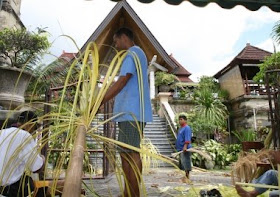Aditya Suharmoko, The Jakarta Post, Jakarta | Mon, 12/22/2008 2:49 PM

DIFFERENT WORLDS: European tourists in April watch Papuans in their traditional outfits. Indonesia’s rich diversity of traditions and cultures is one of its major draws for foreign tourists, although critics say the government failed to market this aspect properly as part of the 2008 Visit Indonesia Year campaign. (JP/P.J. Leo)
Attracting 6.4 million foreign tourists to a country so rich in sights and experiences that few places in the world can match it should be an easy task, even without an expensive government campaign.
Yet somehow it wasn't. Even with months of preparations and extensive promotions as part of the 2008 Visit Indonesia Year campaign, Indonesia fell short of its target for the year.
By the end of October, the number of foreign tourist arrivals in 2008 had reached 5.1 million, according to the Central Statistics Agency (BPS). While this represents growth of 13.07 percent from the same period of 2007, making up the 1.3 million shortfall by the end of the year seems to be asking too much.
The initial target, when the campaign was launched, was for 7 million visitors. But after months of extensive promotions, in June the Culture and Tourism Ministry revised down the target to 6.4 million, citing weakening purchasing power due to the global economic slowdown.
"With the looming (economic) crisis, I'm afraid we won't have the expected peak of foreign tourist arrivals in December," said Sapta Nirwandar, a director general at the ministry.
BPS chairman Rusman Heriawan said Indonesia might receive only about 6 million tourists this year, provided November and December each had at least 500,000 visitors.
"But you can't say that the government has failed. It (the number) is an expectation, and you can't expect it to be reached instantly," Rusman said.
Echoing Rusman, Indonesian Hotels and Restaurants Association chairman Yanti Sukamdani said it would be good enough for Indonesia to receive 6 million visitors.
"Visit Indonesia Year is a good campaign. Without it, Indonesia's tourism would remain so-so," Yanti said, adding that the hotel occupancy rate had risen by between 10 percent and 15 percent from a year earlier.
According to the BPS, the occupancy rate of star-rated hotels in September was 42.66 percent, with an average length of stay of 2.57 days. The rate was higher in August, reaching 55.19 percent.
Despite these improvements, Indonesian tourism is definitely falling behind its neighbors in many respects. The Jakarta Post's WEEKENDER has reported that Thailand, Malaysia and Singapore combined succeeded in attracting a total of 46 million tourists in 2007.
The three have succeeded by narrowing their promotions to the best they have to offer. Singapore, for instance, has been promoting itself as heaven for fashionistas, drawing shoppers from around the globe, including rich and trendy Indonesians.
Meanwhile, Indonesia keeps singing the same old song: Inviting people to visit without mentioning what makes it different from its neighbors, or indeed, anywhere else in the world.
Promotions that focused consistently on the archipelago's unique landscape and diverse cultures would definitely help.
The beaches, mountains and tropical forests that adorn so many parts of the country should be a major draw for visitors. Yet, besides the ever-popular Bali which for some tourists is Indonesia - so many wonders, whether in Kalimantan, Sumatra or Sulawesi, to name just a few, seem to be overlooked.
The relative low cost of Indonesia should also be a draw, perhaps even more now than ever. Not only could the global economic crisis put some other countries out of reach for those on a shoestring, backpacking is becoming increasingly popular.
Felix Dass, a young traveler, said Indonesia should be a main destination for every traveler. Nature in this country is just so beautiful. Natural beauty is one of the reasons a place can be considered as a tourism destination."
However, he said, Indonesia had yet to manage to provide decent tourism facilities and services.can help people have a comfortable and safe vacation, while Indonesia has not been able to do so. Bangkok has signs in local and Latin languages everywhere, for example, while we find this kind of thing even in Jakarta."
Attracting tourists needs more than slick promotions. Further development in supporting infrastructure and more relaxed visa regulations are among the other issues that need to be addressed to better the country's tourism industry.
The government now has another year to redeem itself, as it has extended the Visit Indonesia Year campaign to 2009, with the target for foreign tourist arrivals set at 7 million.
Sapta has said the ministry remains upbeat about next year's target, although acknowledging great challenges too.
"Next year there will be greater challenges for tourism stemming from the global economic downturn and the upcoming (legislative and presidential) elections," he said.





















